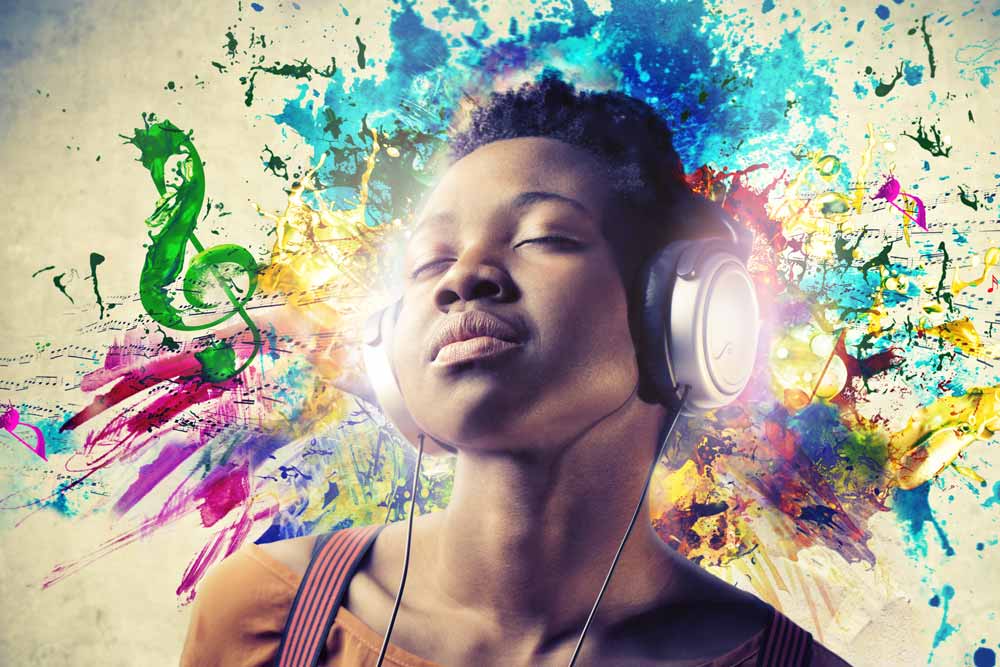If you are one of the 515 million (monthly) active users who listen to music on Spotify, then you know how music can help you get through the day. Today, Spotify has over four billion playlists to choose from whilst studying, so get your study mood on: shuffle, play, and switch the brain button on while you read about why music is an essential part of our lives!
I think we can all agree with the lyrics ‘Thank you for the music, the songs I’m singing, Thanks for all the joy they’re bringing’ from ABBA. But while music brings us joy and keeps us moving, many of us use music to help us concentrate or study. What does science say about this?
Why Do People Like to Listen to Music while Studying?
A study done by One Poll on behalf of Colorado State University Global (CSU) found out that 49% of the 2,000 respondents listen to music as part of their study routine. The poll was conducted on American students. The students who listen to music tend to enjoy learning and memorising new information. Furthermore, 64% of those who listen to music said they had an easier time taking tests, and 80% felt more prepared for class. Music listeners were most likely to use different methods such as notecards or other creative tools to help them study.
CSU is not the only institution to commission this kind of study. Multiple studies by various educational institutions have researched the relationship between music and studying. Music can be a therapeutic mechanism; it has a profound effect on our mood, blood pressure, and heart rate. Medical research has also shown that music is healthy for our nervous system, especially the brain.
Another research study done by University of Windsor in Canada concluded that, ‘the positive effect and quality-of-work were highest with ongoing background music, while time-on-task was longest when music was removed.’

Did you know?
On average teenagers and young adults listen to music for 2 hours and 5 minutes everyday.
Do Different Music Genres Affect your Brain Differently?
We all have that one song that moves us, both physically and emotionally. Some music is powerful enough to give us goosebumps and light up our brain’s ‘reward centre’. Our brain reacts to music and our favourite melodies by releasing dopamine, known as the feel-good hormone, which activates our brain’s pleasure and reward system. Music can have a positive, immediate impact on our mental state; fast tempos can psychologically and physiologically arouse us, helping energise us for the day.
Researchers from Harvard Medical School found that music, or at least some types of music, acts as an ‘exercise’ that warms up selected brain cells, allowing them to process information more efficiently. For example, soothing music like Jazz helps us destress and has a healing feeling, while upbeat music releases endorphins (hormones) which makes us happy and increases our immune system. Pop music boosts energy and helps us exercise better, and if you would like to remember the periodic table, you might want to give classical music a try, as it helps in memory recall.
The top genres to listen to whilst studying suggested by research are:
- Classical
- Spa and meditation music
- Ambient and nature sounds
- Electronic music
- Film soundtrack
- Lofi hip hop
- Jazz
The aforementioned study by CSU concluded that students prefer to listen to one specific genre of music whilst studying. In fact, 30% of respondents prefer listening to nature sounds, 26% prefer the sound of the hustle and bustle from outside, and 24% study better when listening to podcasts.
How Does Music Affect the Brain?
Scientists have confirmed that listening to music frequently enhances our happiness, and when we feel like doing some karaoke or joining a dance party, it helps us connect with one another. Whether it’s through love songs when dating, the lullabies we sing to infants, or national anthems, music is a crucial part of human evolution. The effects of music are:
- Improves our mood
- Decreases pain
- Boosts energy
- Helps us learn faster
- Helps reduce anxiety
- Helps reduce stress
Music helps us memorise and increases productivity. Any student can confirm that these are essential factors when studying or preparing for exams. We all know the struggle of procrastination and demotivation; therefore, studying with music can mellow the stress and anxiety built up during exam period. It can also allow us to enjoy the process of learning more!
Students can use music to motivate themselves into studying. A playlist can also serve as a built-in timer. When the music is up, it’s time for a break! Most importantly, music increases our focus. Student life can be very hectic, especially with different subjects and other daily commitments; therefore, a pair of headphones and some tunes can be very useful on the way to an exam!

The Mozart Effect
The Mozart effect is a theory which suggests that listening to classical music (specifically Mozart) somehow improves the brain and can make you more intelligent. In the early 1990s, the media picked up a story in the journal Nature which sparked public interest. While the media conflated the results, suggesting that listening to Mozart would increase a child’s IQ, the study itself was much more modest.
The study itself was only conducted on 36 young adults (not children). 36 is hardly a representative sample. While listening to classical music does not make you smarter, it can help you focus.
Does Listening to Music Help Learning?
We have finally found something that motivates us to study, and I think most of us can agree that music is an absolute motivator; however, there is a catch!
Have you ever considered that listening to music and studying is multitasking? Cognitive psychologist Brian Anderson says, ‘Multitasking is a fallacy; human beings are not capable of truly multitasking because attention is a limited resource, and you can only focus on so much without a cost.’
Both studying and listening to music require cognitive effort, but one of the activities will get more attention than the other. There is only so much information you can retain doing both activities. Therefore, is the information we process during studying at the cost of listening to our playlist?
Steven Smith, cognitive neuroscientist for the Department of Psychological & Brain Sciences, provided one suggestion for students who wish to continue this study habit: ‘In general, words are distracting.’ In conclusion, if you need music as part of your study routine, consider listening to music without lyrics, so you do not get tempted to sing along and end up using your cognitive capacity in memorising the song. You can always do that in the car!
You might also try listening to music in another language that you don’t understand at all, otherwise the words are going to distract from what you’re trying to study.
There are more than four billion playlists to choose from on Spotify. Such a wide variety to choose from can be overwhelming! Why not check out THINK’s playlist? We made it just for you (and us)!

Further Reading
Goltz, F., & Sadakata, M. (2021). Do you listen to music while studying? A portrait of how people use music to optimize their cognitive performance. Acta Psychologica, 220, 103417. doi:10.1016/j.actpsy.2021.103417
Mercer, M. (2021). Does Listening to Music Really Help You Study? Retrieved June 14, 2023, from https://liberalarts.tamu.edu/blog/2021/03/10/does-listening-to-music-really-help-you-study/
Thoma, M. V., La Marca, R., Brönnimann, R., Finkel, L., Ehlert, U., & Nater, U. M. (2013). The Effect of Music on the Human Stress Response. PLoS ONE, 8(8), e70156. doi:10.1371/journal.pone.0070156
Trimble, M., & Hesdorffer, D. (2017). Music and the brain: the neuroscience of music and musical appreciation. BJPsych International, 14(2), 28-31. doi:10.1192/S2056474000001720





Comments are closed for this article!